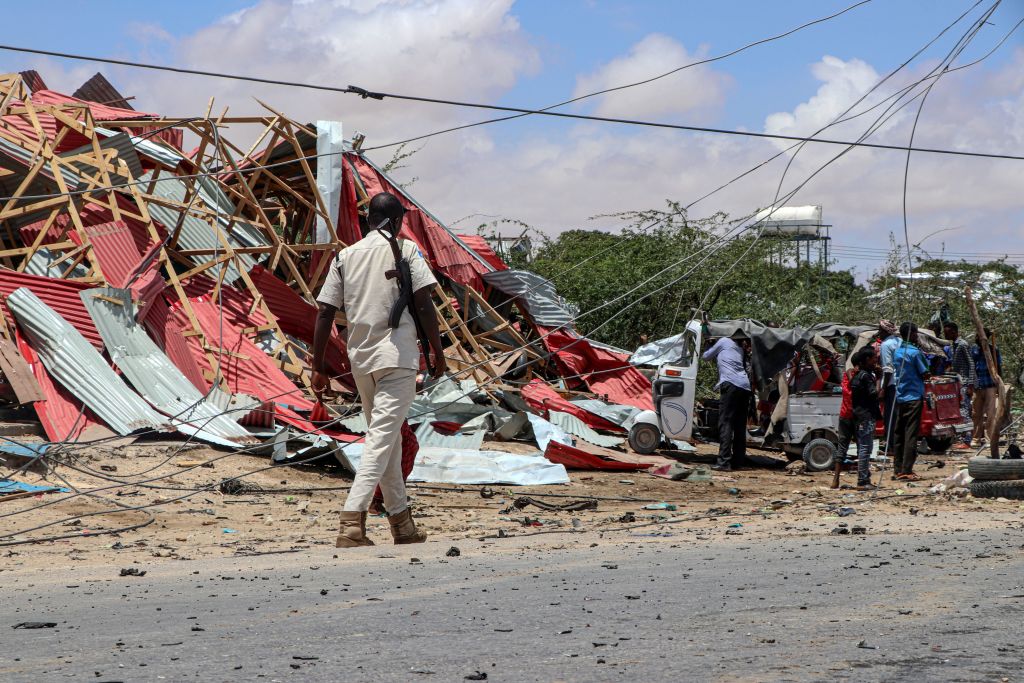ADF STAFF
Somalia has one year to eradicate al-Shabaab from the country and end 17 years of war, President Hassan Sheikh Mohamud announced in late November.
The al-Qaida-linked terrorist group has been launching attacks in Somalia since 2006, during which it has caused the deaths of thousands and displaced millions.
Speaking to a crowd at London’s Royal United Services Institute, Mohamud said African Union Transition Mission in Somalia (ATMIS) forces are working to eliminate the remaining al-Shabaab fighters in the country, but their efforts are hamstrung by recent flooding.
ATMIS, which includes troops from Burundi, Djibouti, Ethiopia, Kenya and Uganda, was set to begin a second phase of withdrawals from the country in September with a drawdown of 3,000 troops. However, the U.N. Security Council postponed the second phase of withdrawals by three months in early November.
“It just coincided with a time that we have some setback and we have been struggling to reorganize,” Mohamud said of the postponement. “But now we are ready.”
Brig. Gen. Peter Gaetano Omola, the Ugandan contingent commander under ATMIS, applauded the Security Council’s decision.
“Definitely, the security of this country should one day be in the hands of the Somalis but you shouldn’t rush it because it can deteriorate within the twinkle of an eye,” Omola told Ugandan newspaper Daily Monitor.
Mohamud insisted in London that his government will not ask for additional postponements to the troop withdrawal plan.
“In 2024, as gradual drawdown is going on, we will also be generating forces and building more,” Mohamud said. “We are very much comfortable that we will take over the responsibility of the security of our country.”
Somalia’s recent offensive against al-Shabaab began in August 2022, with the military rallying behind clan-based militias in the central part of the country. That collaboration achieved the most significant territorial gains against al-Shabaab since the mid-2010s.
However, al-Shabaab attacks surged during the first phase of the troop drawdown, which concluded with 2,000 Soldiers leaving at the end of June.
Between May 27 and June 23, the Armed Conflict Location & Event Data Project recorded more than 200 attacks or violent incidents linked to the terrorist group in Somalia. More than 700 people died in the attacks. Most of the violence was in the Lower Shabelle region, which surrounds Mogadishu, where al-Shabaab launched dozens of attacks against ATMIS troops.
As government forces regroup, al-Shabaab is increasing the use of 107-millimeter rockets in Mogadishu in attacks targeting politicians and civilians, according to Catriona Laing, special representative of the secretary-general and head of the United Nations Assistance Mission in Somalia. The conflicts have killed nearly 1,300 civilians this year.
Mohamud said the next phase of operations against al-Shabaab will be in the southwest of the country and in the state of Jubaland, a historic al-Shabaab stronghold.
“The status of the fight against al-Shabaab is encouraging,” he said in London. “I believe that we will defeat al-Shabaab … soon.”
There are no indications that al-Shabaab would entertain dialogue with the Somali government, but Mohamud said that is his preferred option.
“At the end it may end up with dialogue, rather than killing and maiming and chasing away,” he said.

